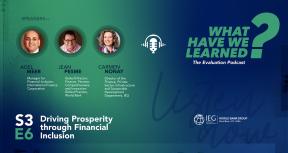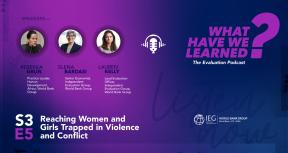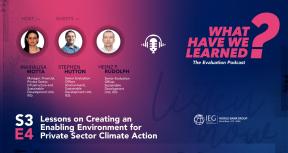Every year, the world generates 2 billion tons of trash, including 400 million tons of plastic. Most of this waste is mismanaged, piling up and flowing into our oceans, adding to greenhouse gas emissions and land and water pollution. A long-term solution requires the world to shift to a circular economy. What does circularity entail? What can we learn from global efforts to tackle solid waste, and in particular plastics?
Host Jeff Chelsky talks trash with Steve Fletcher, Professor of Ocean Policy and Economy at the University of Portsmouth, to take stock of lessons from a waste crisis that is disproportionately affecting people in poverty.
Listen on Spotify, or Apple Podcasts.
Related Resources
Read the transcript
Jeff Chelsky: Municipal solid waste: the trash that cities and towns produce or, what most of us call garbage, is projected to triple in volume in low-income countries and nearly double in middle-income countries by 2050. So why does this matter?
Well, heaps of trash silently pile up and flow into our oceans becoming a growing threat to people and the planet. Currently, most of this waste is managed improperly, untreated, and disposed of in open dumps. Left unmanaged, the growing volume and changing composition of waste, including non-biodegradable and plastic waste, will contribute to an increase in greenhouse gas emissions and land and water pollution, which disproportionately affect the health and welfare of impoverished people.
Welcome to What have we Learned? the evaluation podcast. I'm Jeff Chelsky, Manager of the Economic Management and Country Programs Unit at the World Bank Group's Independent Evaluation Group.
In this episode, we're going to talk about municipal solid waste.
Since this is an issue of considerable importance to developing countries, it's not surprising that the World Bank Group is by far the leading source of multilateral lending and knowledge generation on solid waste management, providing about US$3 billion between 2010 and 2020.
The Independent Evaluation Group recently published Transitioning to a Circular Economy: An Evaluation of the World Bank Group's Support for Municipal Solid Waste Management [https://ieg.worldbankgroup.org/evaluations/transitioning-circular-economy]. The report notes that the international community, including the World Bank Group, has been slow in implementing a comprehensive approach to this challenge.
While the Bank Group has set a goal of pursuing integrated waste management and circular economy approaches to help countries and cities advance waste hierarchy and circular economy principles, these have yet to be adequately mainstreamed into many bank-supported country strategies and operations.
With me today is Dr. Steve Fletcher, Professor of ocean policy and economy and Director of the Global plastics Policy Center at the University of Portsmouth. He's a member of the International Resource Panel, an expert in plastics and ocean policy, and has worked extensively with the United Nations family of ocean and biodiversity conventions.
Steve, welcome to What Have We Learned?
Steve Fletcher: Thank you, Jeff. It's great to be here.
Jeff Chelsky: Now, you are a member of the team that prepared the IEG evaluation of the World Bank Group's support for Solid Waste Management, and you focused on the challenges presented by plastic waste. How effective do you think we've been when it comes to helping lower income-countries manage plastic waste?
Steve Fletcher: I think this isn't just a World Bank issue, but an issue for governments and development banks around the world.
It's probably fair to say that the vast majority of the plastics pollution problem in the world is faced by poor countries. What we tend to find in poor countries is that their solid waste management systems are just not as developed as they need to be to cope with the sheer volume of waste that is generated. This includes waste produced by the country itself and, in some circumstances, plastic waste that is imported from more developed countries. And that's incredibly problematic.
Poor countries have very low levels of formal waste collection, very low levels of sorting of waste into different waste streams, and relatively low levels of recycling or reuse. This results in a significant number of open dump sites and a lot of open burning of waste — as a way to get rid of some of it.
Burning plastic is extremely toxic. There are some estimates, that I can't really confirm myself, according to which up to 1 million people per year die in developing countries from the toxic effects of mismanaged plastic waste. That could be through ingestion (consuming plastic entering the food chain) or inhaling (breathing in the smoke from burned plastic). This is unacceptable.
So, there are chronic health and environmental crises for millions of people in the global south who are living in some of the poorest conditions, in addition to the pollution they're having to face.
So, the waste management system in large parts of the global south, and particularly in urban areas, is just not up to the job of dealing with the sheer volume of waste that's being created in those places.
Jeff Chelsky: Now, just to take a step back and touch on the distinction between recycling and reusing, poor households can be incredibly innovative in reusing materials, much more so than a lot of us in more developed countries. So, is the problem largely on the lack of facilities for recycling?
Steve Fletcher: The way I sometimes think about it, Jeff, is to picture somebody sitting under a waterfall of waste, just drenching them in waste. And that's the situation for many poor countries, where the amount of waste being generated is so high that even with the most imaginative and innovative way of dealing with it through reuse, it's impossible to cope with its volume.
And the same with recycling, in a way. A lot of plastic, and other types of waste, can be recycled. The challenge is how do you extract the recyclable material out of the waste streams. And how do you then transport that material to a suitable recycling facility? And is there even a market for that recycled material once it has been recycled? Because, at the moment, particularly in the plastics industry, virgin plastic is still cheaper than recycled plastic. So, there's no real incentive in the product manufacturing industry in many parts of the world to shift towards recycled plastics.
Some countries are starting to place minimum recycled content targets on plastic products, which means that product designers and manufacturers must source recycled plastic to go into the products. That helps build the market for recycled material and gives confidence to investors to invest in recycling plants where there is a lot of recyclable material that's currently not being used.
But until all those things are in place, it's really difficult to shift the system towards recycling because none of those things by themselves can change the game sufficiently to make recycling a profitable and worthwhile activity. Even though most of us around the world would think recycling is the best thing to do to reuse the material and retain it in the economy, to hold the financial and carbon value of those items, recycling is a very hard-headed economic business, and it must turn a profit.
Jeff Chelsky: Could you describe the concept of a circular economy approach?
Steve Fletcher: Yeah, of course, Jeff. Sometimes it's best to think about a circular economy in contrast to the type of economy we currently have in most countries, which is a more linear economy. In a linear economy, we take resources out of the ground, out of the sea, or wherever they come from, and we create products from those resources. We then sell those products to other businesses or to other people so they can be used in various ways, and, at the end of their useful life, they become waste. Currently, in a linear economy, those items of waste end up in landfill sites, incinerated, or leak into the environment as some form of pollution.
Now, plastic is found everywhere in the world's environments: from the top of Mount Everest to the bottom of the deepest ocean trench, and everywhere in between.
In contrast to that, a circular economy is where the resources that we produce, once they've been used, they're then used again: they recirculate in the economy, time after time. As a result, it is a very low-waste and low-pollution economy. A circular economy has interesting implications for how we think about and design products. Instead of designing products that we're happy to see end up in landfill, for instance, we have to design products differently, to make sure that they are recyclable or that their recyclable components can be removed.
So, imagine a huge flow of plastic products entering the economy. Some of those plastic products will be things that we don't actually need, therefore we can reduce plastics entering the economy just by not creating the products that we don't need, and we can set criteria to identify what those products are.
Then we can look at products that contain plastic and don't need to contain plastic. And we can try and substitute the plastic for some other form of material that's more sustainable. And we would do lifecycle assessments to make sure that we did choose the right materials.
We're simply taking plastics out of the economy through substitution and by simply choosing products and designs that use less plastic.
So, we can now imagine a smaller flow of plastic entering the economy because we've taken out all the unnecessary stuff. The remaining plastics, which must be necessary in some way, we try to keep in the economy for as long as possible. So that's where we get into recycling and reusing.
In a sense, there are three steps: one is to reduce the amount of plastic entering the economy as much as possible. That includes plastic that can't be recycled, can't be reused, and it's toxic to people or nature. We should get rid of all that straight away. We then have a much smaller flow of plastic that we circulate as much as possible. We would be dealing with much less plastic and that's why, in the circular economy model, we'd need less recycling infrastructure.
So, the transition to a circular economy creates huge business opportunities to think about how we design products differently, and in effect, design out pollution from the economy.
Jeff Chelsky: The IEG report made recommendations including the need to streamline the waste hierarchy and strengthen circular economy approaches within bank group work. It also recommended strengthening the Bank's convening power to coordinate siloed efforts among multiple organizations. How might the World Bank and other development institutions work together to implement these recommendations?
Steve Fletcher: Yeah, that's a tough question. There's global recognition that the transition to a circular economy is critical to solving many of the world's problems, not just waste management or plastic pollution. It is also important for tackling climate change and dealing with biodiversity loss. Using our resources more efficiently and using less virgin material— be it plastic or anything— is all going to make for a more resource-efficient, less polluting, less climate-damaging global economy.
The question, therefore, is why isn't that transition happening as quickly as we need it to? Because the situation is urgent, right? We're having a nice conversation here, but the situation is urgent and requires immediate action. So, the World Bank and its development partners can offer a collective global leadership to push the transition to a circular economy hard and get it embedded into the investment strategies of all the major development banks and placed front and center in national development plans. They can make sure that it is then filtered down into specific industrial or activity sectors within national economies —that could be plastics or tourism, or anything else—. They can try to embed the circular economy at the heart of everything that we do, really.
Jeff Chelsky: If you were to come up with an additional recommendation to include in the IEG report, some way of making the World Bank Group more effective in its support for developing countries to manage plastic waste, what would you recommend?
Steve Fletcher: I think, Jeff, if I were to reflect on that point, I would really focus on the urgency and scale of the problem. According to recent research, the response by countries and businesses to the rising rate of plastic pollution will only reduce the increase in pollution by 7% by 2040. That's only slowing the increase by 7%.
We will still see huge growth in plastic pollution between now and 2040 with the current level of policies. So, what I really fail to see is any sense of matchup between the scale of the problem and the scale of the response that's currently in place. I'm not sure this is a direct recommendation to the World Bank, but it's to inject urgency into well-intended efforts that are genuinely being made to solve the global plastics problem. I think it does come down to taking responsibility and leadership. This is a global problem, so we would be looking to global institutions to really drive that forward.
In fact, we have hope, you'll be glad to know. At the last UN Environment Assembly there was an agreement reached by countries on a mandate for a legally binding instrument to end plastic pollution.
The text of this agreement needs to be developed by the end of 2024. The agreement should incorporate all types of plastic, should focus on circular treatment where possible, and it's looking at plastic pollution of all types, not just ocean plastic pollution.
And it's probably fair to say there's a strong push from the international community, and from a series of progressive businesses, for this global agreement to really change the game when it comes to plastic pollution. That global agreement needs to take on board the recommendations of the report that we produced for the World Bank Group and really take on the idea of leadership and of convening a coalition to achieve global change. I don't think anything less than that will be sufficient in this case.
Jeff Chelsky: Are you optimistic?
I'm optimistic that enough people in positions of influence want this to happen. And I'm seeing very little obvious pushback. I'm sure there is pushback and vested interests who are very keen to push back on a global agreement to reduce plastic pollution because this has a whole series of implications for the economy, and economies, around the world. But I find it hard to accept the current situation where ecosystems are incredibly threatened by plastic pollution and poor waste practices. Where people are dying because of mismanaged waste and open burning of plastics, and where the climate is suffering even more through the mismanagement of plastic waste. None of those things are acceptable. We need a global solution to address this and the process to develop a legally binding global agreement to end plastic pollution is the best hope that we have on the table at the moment. Right now, until it's proven otherwise, I am optimistic that there is the political will to drive through an ambitious agreement.
Jeff Chelsky: I wish we had more time to talk and I hope our listeners have learned at least half as much as I have during our chat. Thank you. We've been listening to Dr. Steve Fletcher, Professor of ocean policy and economy.
This has been What Have We Learned? the IEG podcast and I'm Jeff Chelsky, your host. We've been discussing the Independent Evaluation Group’s recently published report Transitioning to a Circular Economy: An Evaluation of the World Bank Group's Support for Municipal Solid Waste Management [https://ieg.worldbankgroup.org/evaluations/transitioning-circular-economy]. You can find the report on IEG’s website at [ieg.worldbankrgroup.org], where you can also subscribe to this podcast and future podcasts for listening on your favorite platform.
This is What Have We Learned? the IEG podcast and I'm your host, Jeff Chelsky. I wish everyone well.
This Episode’s Featured Guests:


Steve Fletcher is Professor of Ocean Policy and Economy and Director of the Global Plastics Policy Centre at the University of Portsmouth. He is a member of the International Resource Panel and an expert in plastics and ocean policy. Professor Fletcher has worked extensively with the United Nations family of ocean and biodiversity conventions and has a global network of research, policy, and practice collaborators. He was formerly Chief Strategy Officer for the UNEP World Conservation Monitoring Centre in Cambridge and Director of the Centre for Marine and Coastal Policy Research at the University of Plymouth. He is widely published in the ocean governance and plastics sector and is the founding Editor-in-Chief of the journal Plastics.






